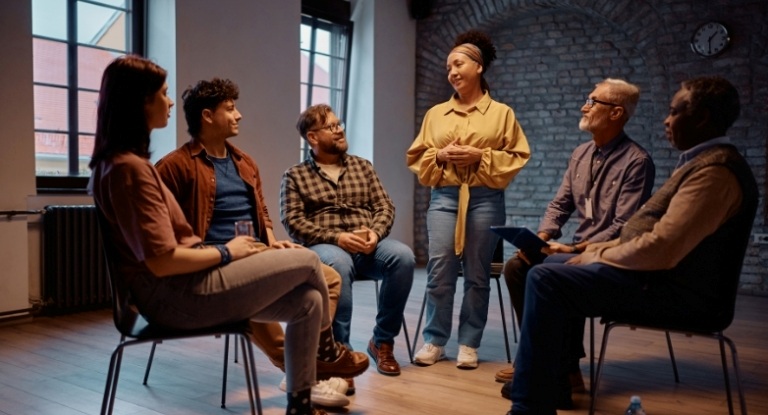
Group Therapy for Drug Addiction – A Comprehensive Guide
Recovery can feel like a lonely journey, but group therapy for drug addiction provides a space to connect with others, share experiences, and heal together in a supportive environment.
Group therapy for drug addiction is a structured, therapist-led session where participants connect, share experiences, and work on recovery in a safe, supportive environment with others facing similar challenges.
Curious about how group therapy can support your recovery? Keep reading to discover the different types of group therapy and how it can help build lasting change on your journey.
How Group Therapy Works in Addiction Treatment
Group therapy for addiction treatment is a powerful approach, designed to foster healing through connection and shared experiences. Here’s how it works:
- Who Leads It:
Group therapy sessions are led by licensed therapists or counselors who specialize in addiction recovery. These professionals provide expert guidance, ensuring that the group stays focused on recovery goals while creating a safe and productive environment for everyone. - Structure:
Sessions are typically held weekly, providing consistent support and accountability. Groups are intentionally kept small, usually consisting of 6-10 participants. This smaller size allows for deeper connections, more personal sharing, and individualized attention from the therapist. - Rules:
To create a safe space, strict guidelines are followed. Confidentiality is a cornerstone, ensuring that everything discussed within the group stays private. Respect for one another is non-negotiable, with participants encouraged to listen, share, and offer support without judgment. - Environment:
The environment in group therapy is carefully cultivated to be safe, supportive, and nonjudgmental. Participants feel encouraged to share their struggles and victories, knowing they are in a space where their experiences are valued and understood.
In this supportive setting, individuals can learn from others, build coping skills, and gain the confidence needed to continue their recovery journey.
Real people. Real support.
Seeking Help for Yourself or a Loved One?
Connect with our professionals to start the journey to recovery.
Call 860.388.9656 for immediate support.
Types of Group Therapy
Group therapy for drug addiction provides specialized sessions to meet the diverse needs of individuals in recovery. Each type targets specific aspects of addiction, offering a supportive, structured environment for healing. Here’s an overview of the main types:
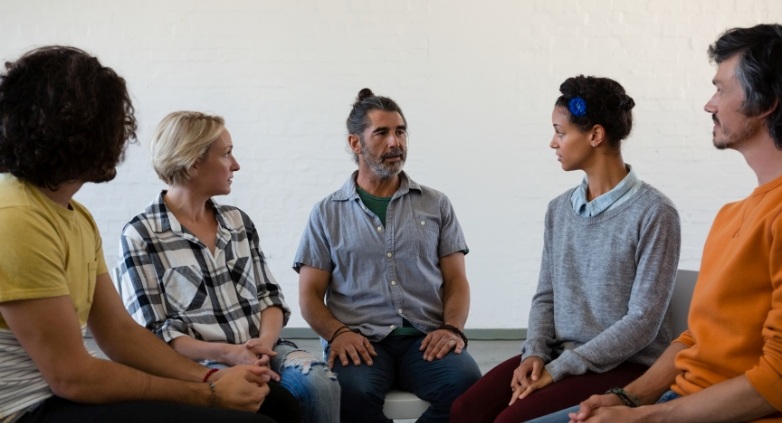
1. Psychoeducational Groups
Psychoeducational groups provide participants with essential information about addiction, its effects, and recovery strategies. These sessions help individuals understand the science behind addiction and equip them with knowledge to stay sober.
Ideal for those who are new to recovery, they offer a foundation for healthy decision-making and building a strong recovery mindset.
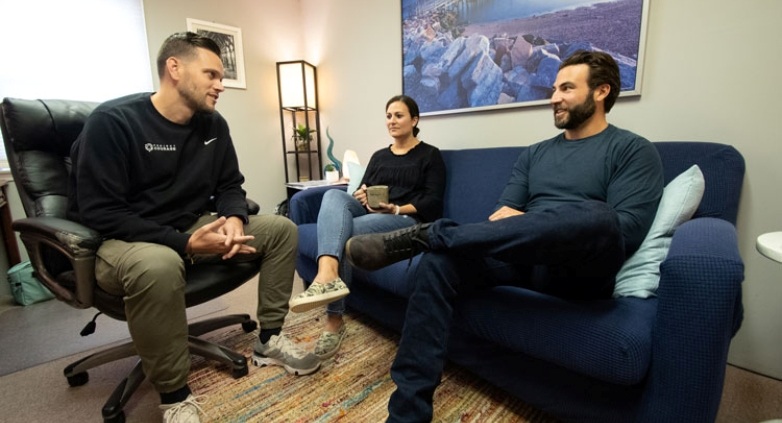
2. Skills-Based Therapy Groups
The Skills-based therapy groups focus on teaching practical coping skills such as stress management, emotional regulation, and communication strategies. These groups are designed to help participants develop the necessary tools to handle daily challenges in recovery.
They are particularly beneficial for individuals who want to strengthen their ability to manage emotions and prevent relapse in real-life situations.
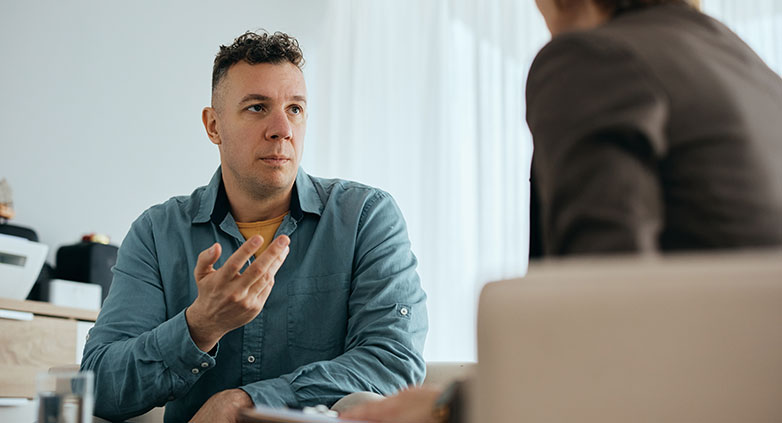
3. Process Groups
These groups provide a space for participants to explore and discuss their emotions, experiences, and challenges in addiction recovery. The therapist leads discussions, helping participants gain insight into their behaviors and reactions.
These groups are most effective for individuals who are ready to address deeper emotional issues and benefit from peer support in navigating their recovery journey.

4. Trauma-Informed Groups
This addresses the connection between trauma and addiction, offering a sensitive approach to healing. These groups create a safe environment for individuals to explore past traumas that may be contributing to their addiction.
Ideal for those with a history of abuse or trauma, they focus on healing emotional wounds while supporting recovery in a compassionate, understanding environment.
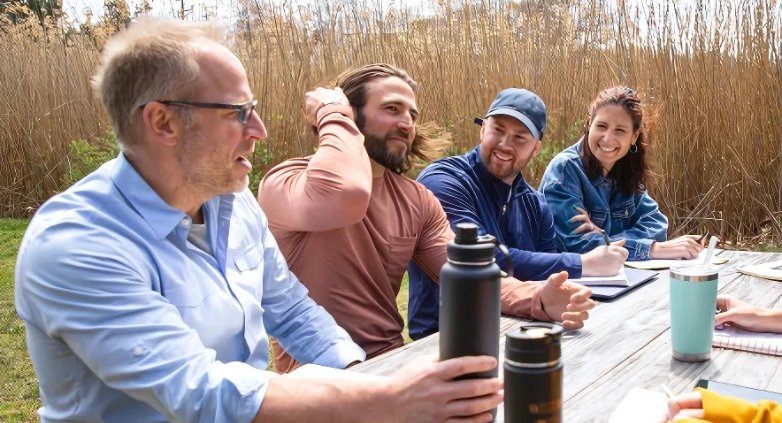
5. Family-Inclusive Group Therapy
Group therapy for drug addiction brings family members into the recovery process, improving communication, rebuilding trust, and educating loved ones about addiction. These sessions are designed to strengthen family dynamics and foster a collaborative approach to recovery.
They are ideal for those who want to involve their family in their healing journey, ensuring that everyone plays a positive role in supporting sobriety.
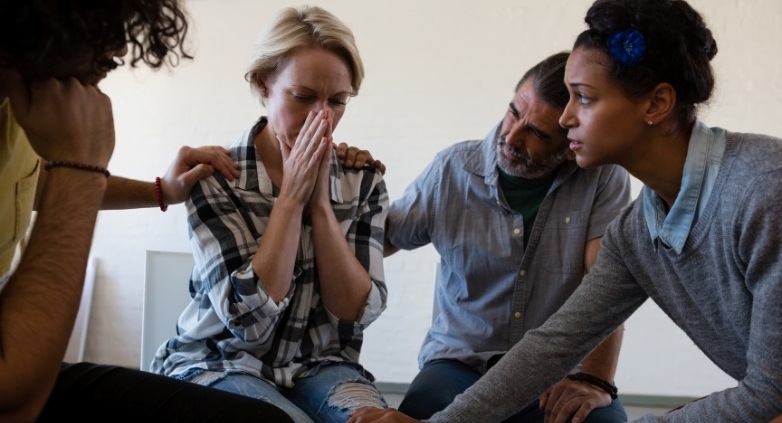
6. Relapse Prevention Groups
Relapse prevention groups focus on identifying triggers and developing strategies to prevent relapse. These groups teach participants how to manage high-risk situations and cope with cravings.
Ideal for individuals transitioning from inpatient treatment or those who have relapsed in the past, these sessions help reinforce skills that strengthen resilience and maintain long-term sobriety.

7. Specialized Groups
Specialized groups cater to specific populations, such as professionals, young adults, or the LGBTQIA+ community. These groups offer tailored support that addresses unique challenges faced by these individuals in recovery. They are ideal for anyone who feels that their specific background, identity, or experience requires a more customized and understanding approach to addiction recovery.
Key Benefits of Group Therapy
Group therapy for drug addiction offers a wealth of benefits for those in addiction recovery. Here are some key advantages:
- Shared Experience Reduces Shame
In group therapy, participants realize they are not alone in their struggles. Sharing experiences helps reduce the stigma of addiction, making individuals feel understood and supported, which is crucial for overcoming feelings of shame. - Accountability Builds Consistency
Group therapy provides a built-in support system, where members check in with one another, hold each other accountable, and celebrate progress together. This accountability promotes consistency in recovery and encourages individuals to stay committed to their goals. - Social Connection Supports Mental Health
Addiction often isolates individuals, making recovery more challenging. Group therapy fosters social connection, helping participants build relationships with others who understand their journey. These connections improve mental health and provide emotional support during tough times, reinforcing the importance of a strong support system.
Overall, group therapy encourages emotional growth, mutual support, and lasting recovery through these key benefits.
Free Download
Proven Programs for Lasting Recovery
Receive your free guide to understanding alcohol addiction and discovering recovery programs tailored to you. Learn how to build a personal sobriety plan and get support every step of the way.
Group vs. Individual Therapy
Both group and individual therapy offer unique benefits in addiction treatment, and understanding their differences can help individuals choose the best approach for their recovery journey. Here’s a breakdown:
| Feature | Group Therapy | Individual Therapy |
| Best For | Individuals seeking social support and shared experiences. | Individuals who need personalized attention or deeper emotional work. |
| What It Addresses | Focuses on emotional support, learning from others, and skill-building. | Targets personal issues, trauma, and specific triggers unique to the individual. |
| Why Both May Be Used | Provides a sense of community and accountability, offering diverse perspectives. | Offers a safe, private space to work on personal issues, while complementing group dynamics. |
In IOP (Intensive Outpatient Programs), both group therapy for drug addiction and individual therapy are combined to offer a comprehensive treatment plan. Group therapy encourages shared healing and support, while individual therapy allows for tailored, one-on-one guidance to address deeper personal struggles.
Using both methods ensures a holistic approach to addiction recovery, addressing both the communal and individual aspects of healing. Combining the two can foster long-term success by balancing personal reflection and social connection.
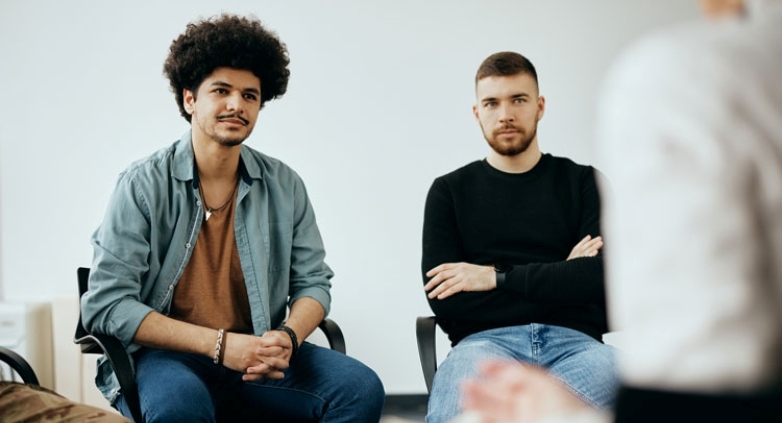
Project Courage’s Unique Approach
At Project Courage, we offer a unique, client-centered approach to addiction treatment, combining evidence-based methods with personalized care.
- Therapist-Led Small Groups
Our group therapy sessions are led by licensed therapists who create a supportive and structured environment for healing. Small group sizes (6-10 participants) allow for deeper connections and more individualized attention, ensuring everyone’s voice is heard. - Family Involvement (Virtual Options Available)
We understand the importance of family support in recovery. Our programs encourage family participation through in-person or virtual sessions, helping rebuild trust, improve communication, and ensure loved ones are involved in the healing process. - In-Home or Hybrid Services (CT & MA)
For those in Connecticut and Massachusetts, we provide flexible in-home or hybrid services. This ensures you receive treatment in a setting that feels most comfortable and convenient, whether at home or through virtual appointments. - Continuity from IOP to Aftercare
We believe in maintaining continuity throughout the recovery process. From Intensive Outpatient Programs (IOP) to aftercare, our approach ensures you’re supported at every stage, helping to sustain long-term sobriety and emotional well-being.
At Project Courage, we tailor our services to meet your unique needs, offering flexibility, family involvement, and ongoing support.
Get in touch with us today to learn how we can help you or your loved ones on the path to recovery.
Who Should Consider Group Therapy
Group therapy for drug addiction is ideal for individuals who are ready to continue their recovery journey with structured support from others. It’s particularly beneficial for those who have recently completed detox or residential treatment, as it provides ongoing guidance and accountability. If you’re feeling isolated, stuck, or prone to relapse, group therapy offers a sense of connection and motivation through shared experiences.
It’s also a great option if you’re seeking flexible, structured support that can be accessed near home, whether in-person or virtually. Group therapy helps create a community of support, offering the tools and emotional encouragement needed to maintain lasting recovery.
Real people. Real support.
Seeking Help for Yourself or a Loved One?
Connect with our professionals to start the journey to recovery.
Call 860.388.9656 for immediate support.
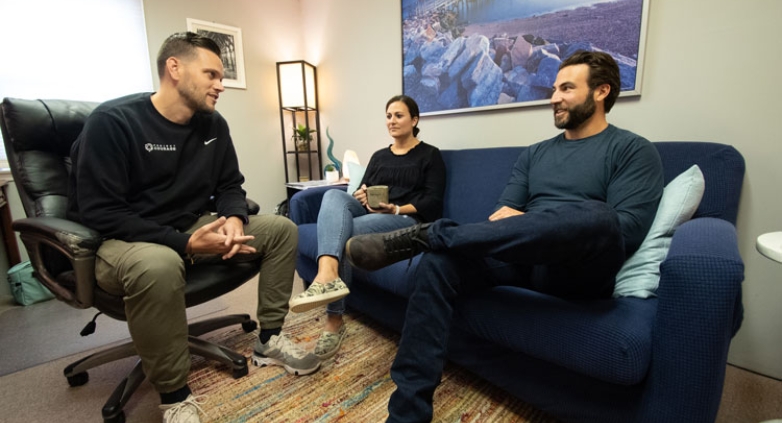
How to Get Started
Starting your recovery journey with Project Courage is simple and low-pressure. We make the process as easy as possible with the following steps:
- Explore Project Courage Services:
Learn about the range of services we offer, including group therapy, individual therapy, family support, and in-home or hybrid services. We tailor our programs to meet your specific needs. - Insurance and Flexibility:
We work with most major insurance providers, ensuring that you can access quality care with minimal financial stress. Our services are flexible, allowing you to choose between virtual, in-person, or hybrid options, depending on what works best for you. - Family or Virtual Options:
Family involvement is crucial for recovery. We offer virtual family therapy sessions so your loved ones can participate, no matter where they are.
Starting group therapy or other services at Project Courage is straightforward and personalized to fit your life and goals. Contact us today to learn more or schedule your consultation.
FAQs
Group therapy is ideal for individuals who are ready to continue their recovery journey and seek a structured, supportive environment. It’s especially beneficial for those transitioning from detox or residential treatment and feeling isolated. If you’re struggling with relapse or need ongoing support, group therapy provides a sense of community and shared healing. It’s also an excellent option for those who value the perspectives of others and want to build long-term connections in recovery.
While both group and individual therapy play essential roles in recovery, group therapy provides the added benefit of shared experiences and social support. In group settings, individuals can connect with others facing similar challenges, reducing feelings of isolation and shame. It also promotes accountability, as participants check in with one another and hold each other responsible for progress. Individual therapy, on the other hand, focuses on personal issues and provides deeper emotional exploration. Combining both methods ensures a comprehensive approach to recovery.
Yes! Family-included therapy is a crucial aspect of recovery. At Project Courage, we offer family-inclusive group therapy sessions that help rebuild trust, improve communication, and involve loved ones in the recovery process. Families can participate in person or virtually, ensuring everyone plays a positive role in supporting sobriety. This collaborative approach strengthens family dynamics, providing a foundation for long-term success in recovery.
It’s natural to feel nervous before your first session. The key is to come with an open mind and be ready to listen. You don’t have to speak immediately, but being honest when you’re ready can help build trust within the group. Reflecting on your goals and any questions you might have can also ease your nerves.
Get in touch with Project Courage to learn more about what to expect.
Free Download
Proven Programs for Lasting Recovery
Receive your free guide to understanding alcohol addiction and discovering recovery programs tailored to you. Learn how to build a personal sobriety plan and get support every step of the way.
Conclusion
Group therapy for drug addiction plays a vital role in the recovery process by providing support, accountability, and a sense of community. It helps individuals gain valuable insights, build coping skills, and stay connected to their healing journey. Whether you’re transitioning from detox, seeking to prevent relapse, or simply looking for a supportive environment, group therapy for drug addiction can be the key to lasting recovery.
Ready to take the next step in your journey? Reach out to us today to learn how our group therapy programs can help you or a loved one overcome addiction. We’re here to support you every step of the way.


